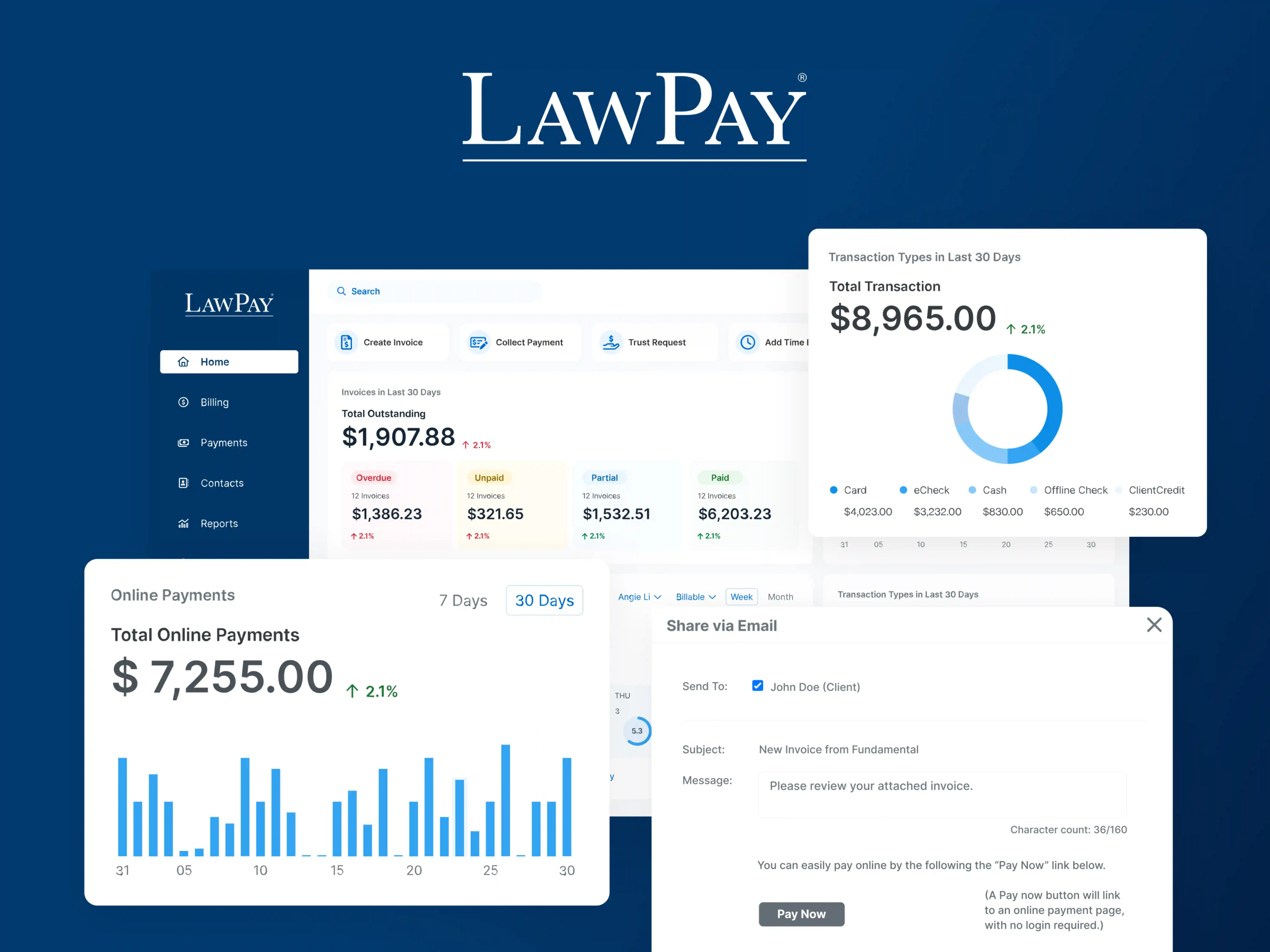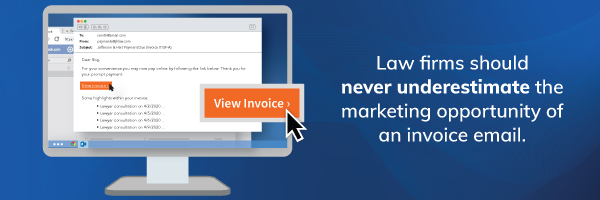Lawyers should expect that every document sent to a client will be closely evaluated and scrutinized—including invoices. Clients rely on billing statements to inform them about progress made on their cases, as well as compensation owed to the firm.
Unfortunately, many law firms lose out on the valuable marketing opportunity that each invoice offers. Instead they send their clients standard computer-generated invoices with cookie-cutter language, void of adequate descriptions.
By following these simple invoicing steps, law firms can easily transform monotonous invoices into powerhouse marketing tools.
Schedule a demo to see what LawPay can offer your firm.
Book Now
Step #1 – Keep It Simple
An invoice is not the place for complicated legal language like “stare decisis.” This type of language confuses clients.
They may start to question the invoice, which can lead to delayed payments or billing disputes. Even a word like “discovery” can prove problematic if clients do not understand its legal meaning. When crafting invoices, law firms should keep their language simple and clear, so clients have no reason to question the information provided.
Also remember that a firm invoice is able to be tendered into evidence, and an attorney could be cross-examined over it. The cleaner and more concise an attorney can make their invoice, the better.
Step #2 – But Not Too Simple
While simple is good, law firms should also ensure that their invoices include language that exemplifies their experience, knowledge, and skill. The ultimate goal of an invoice is to inform the client and compel full compensation, but clients do not always appreciate the value of work completed on their cases. Therefore, attorneys need to employ language that communicates worth in a direct and comprehensive way.
Step #3 – Use Action Words
To turn an invoice into a marketing tool, attorneys should include action words to describe completed work. For example, words like “analyze and “examine” are far more dynamic than the word “review.” This simple switch better describes the real value received.
The right action words have a greater impact on clients while reflecting a high level of professional skill. To better streamline the invoicing process and ensure the inclusion of these action words, law firms can incorporate them into their billing templates.
Step #4 – Demonstrate Progress
Effective word choice should also demonstrate progress made on the client’s matter. When viewing invoices, clients want assurance that their cases are moving forward. If each bill demonstrates progress, they are more willing to make timely and complete payments.
Phrases such as “Advancing the case strategy” and “Proceeding with efforts” demonstrate forward movement. A phrase like “Resulting in the conclusion” shows the outcome of the firm’s efforts. This is the type of language that elevates a legal invoice by promoting the law firm’s brand and reputation.
Step #5 - Avoid “Nickel-and-dime”ing on Invoices
Legal representation doesn’t come cheap, so clients don’t appreciate it when law firms nickel-and-dime them for insignificant tasks. When clients see an invoice filled with unnecessary disbursements, they start to distrust the firm and scrutinize their invoices. By doing away with these disbursements, law firms can preserve their clients’ trust, while also promoting timely payment.
Step #6 – Include Write-offs
Law firms should also inform clients about the costs that are being written off on their behalf. Law firms often complete small tasks at no charge to the client. Firms should include these items in their invoices and state they were completed at no charge, so clients better understand and appreciate the value received.

Step #7 - Recognize the Value of an Invoice Email
Law firms should never underestimate the marketing opportunity of an invoice email. These communications are essentially cover sheets that can enhance the information included within the bill. They offer an excellent chance to inform clients about positive results in a case or highlight expenses that are not being charged to the client.
This additional information helps clients better appreciate the effort that goes into their cases. While it’s not imperative to include detailed emails with every single invoice, they can be extremely useful at strategic points in the case. If no other time, a detailed invoice should always be included with the final invoice.
Step #8 - Ask for Feedback
Another method for turning an invoice into a marketing tool is asking for valuable client feedback. Law firms can use their invoices to confirm that the client’s expectations are being met. A simple statement that invites the client to contact the law office with questions or concerns can go a long way.
A link to a client survey is also an effective method for evaluating the firm’s customer service. Using the invoice to ask for feedback helps firms connect with clients and identify ways to promote new business in the future.
Step #9 - Ask for Referrals
Referrals are a vital marketing tool for law firms, but many lawyers fail to ask clients for them. The invoice offers a perfect opportunity to bring up referrals, particularly when the case has concluded in a positive outcome for the client. Law firms can end their invoice by asking clients to contact the office with any additional legal needs.
They can also ask clients if they have any friends or family members with legal needs. Phrases such as “I’d appreciate any referrals you may provide” and “All referrals appreciated” can also meet this need with little effort.
Schedule a demo to see what LawPay can offer your firm.
Book Now
A well-planned invoice equals effective marketing
An invoice that compels payment and markets a law firm needs to clearly communicate the value and skill provided to the client. Attorneys should not assume that clients understand the work that their matters require. They should also not hesitate to highlight the knowledge, skill, and expertise that goes into providing excellent legal services.
Legal billing systems like TimeSolv offer the features that attorneys need to customize and leverage their client invoices. When law firms take these steps to meet and exceed client expectations, they can transform ordinary invoices into powerhouse marketing tools.
About Erika Winston:
Erika Winston has a passion for law. Through her business, Personal Touch Edits, she helps legal professionals deliver effective written messages. Erika is a regular contributor to TimeSolv and a variety of other publications.
About the author

Erika Winston
